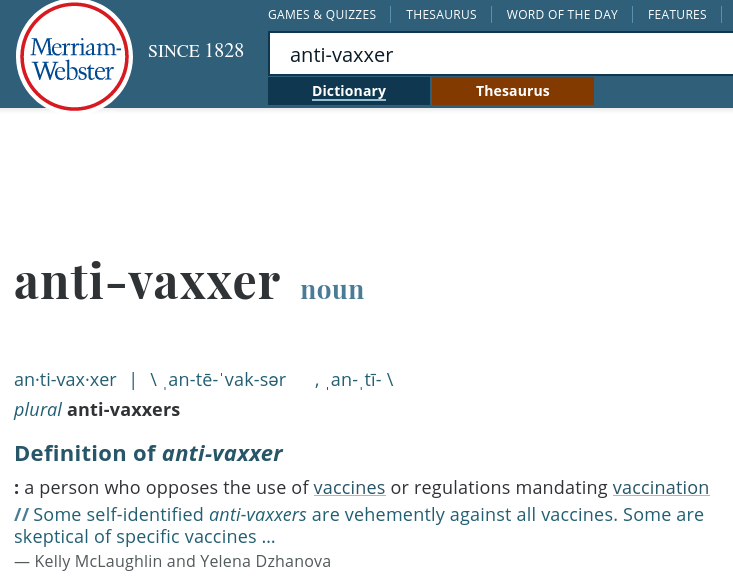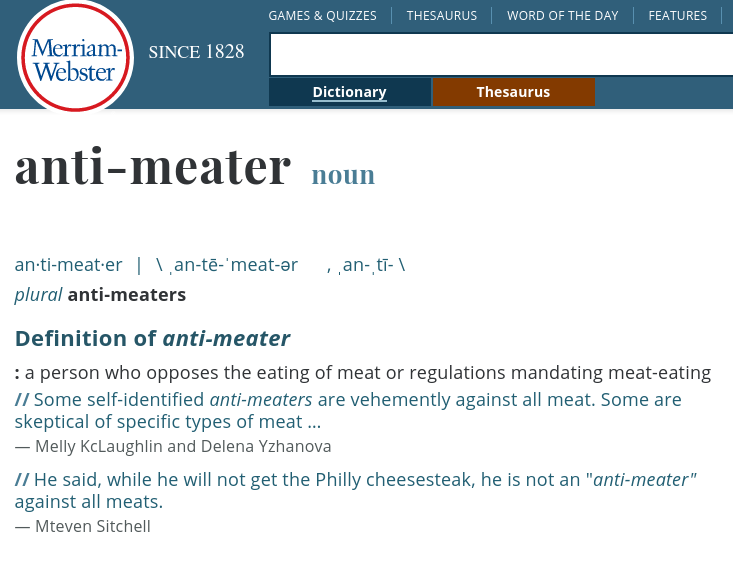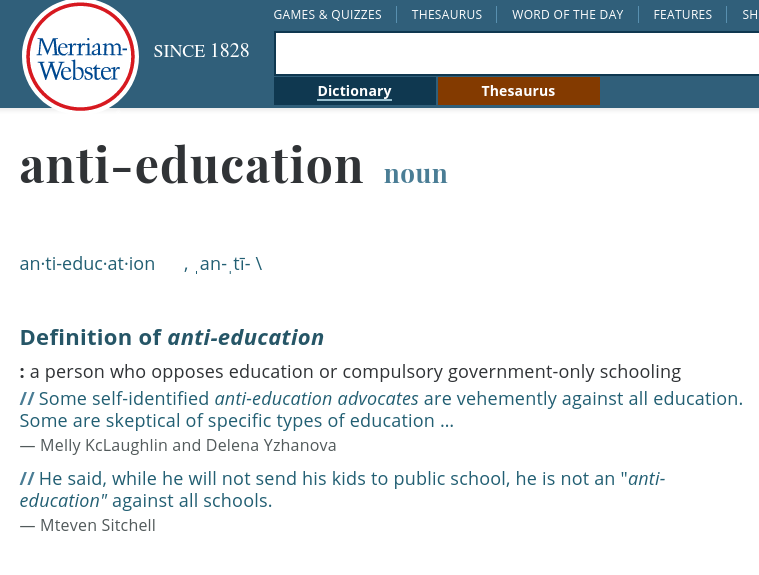The crooked illogic of "anti-vax"
Even at the most basic levels of the public discourse regarding COVID and vaccination — the very definition of terms — we find deliberate deceit.

Pay close attention to this definition by Merriam-Webster:

What do you see?
I see intentional conflation. There is an obvious conflation between two distinct concepts:
- A person who opposes the use of vaccines.
- A person who opposes the use of coercion to administer vaccines to an unwilling person.
The first part of the definition refers to a class of people who oppose the use of vaccines for a variety of reasons — some valid, but most outright nuts.
The second part of the definition refers to a class of people who are against coercing others into doing specific things — in this case, the specific thing is to get vaccinated.
Is there overlap between the two classes of people? Yes. It would stand to reason that quite a few people in the first group would largely be in the second group – if you hate X, you would obviously resist being forced to X.
Are they the same groups? No. Obviously not. There exist many people in the first class that aren't part of the first class. One can — and many do— have a principled objection against using aggression or coercion to force people to do anything, even if it's "for their own good", and even if that "anything" is in fact good for them. The Venn diagram intersects, but it is not a perfect circle.
Just to illustrate the point, I've visited the Werriam-Mebster dictionary to search for various definitions that follow the logic of Merriam-Webster's authors. Here's one:

Do you see what I did there?
Merriam-Webster doesn't conflate these two fictional "anti-meater" groups. The first group, in Merriam-Webster, is what we would call "vegans" or "vegetarians". The second group is just sane people who recognize that mandating something "good" — that means punishing anyone who resists doing that "good" — isn't itself good. Yes, even if it's in the name of "public health".
Does that mean we are all vegans then? To Werriam-Mebster, yes, of course, we are. To any sane person, however, the answer is no, obviously we are not all vegans. Being against laws forcing people to eat meat, does not make anyone a vegan.
Let's do another one. This time we'll steelman Merriam-Webster's logic even harder; we'll do it with something unambiguoulsy perceived as good, and in fact mostly government-supplied and almost universally government-mandated:

I hope you can recognize that no sane person would conflate being against education as a whole, with being against forcing kids into public school — with no option of private schooling at all. I expect that only the most rabid of anti-family Communists, utterly unable to separate "good" from "made 100% mandatory by my Luxury Communist Utopia" would think of these two concepts as a single concept at all.
Do you now see how absurd the work of Merriam Webster is?
Having established that, let's ask ourselves the following question:
Why does Merriam-Webster's Venn diagram of a definition falsely draw a circle where two intersecting circles should be? Why would the authors of this dictionary — an institution of reference with enormous power to define how people think — deliberately conflate these two things?
Well, it's not hard to guess. It's a standard tribal vilification play. They themselves confuse "a good thing" with "coercion in favor of the good thing" as being good. They despise and hate sane people who reject coercion, they themselves support coercion, and they want to further such coercive aims. They know full well that the first "anti-vax" group has a bad reputation, and they want the second "anti-vax" group to have a bad reputation as well. So, by singling out the second group, then conflating the first group with the second group, they transfer all public animosity and hatred against the first group onto the second group. In this sense, their work is similar — if more sophisticated — to claiming that "punching Nazis is good", then calling a bunch of clearly non-Nazi people "Nazis", in order to justify being violent or punitive against them.
Furthermore, this conflation is by no means an accident or an oversight. The authors surely spent a decent amount of time authoring this definition before it was published. The editors of the site must have seen the work and signed off on it. The dictionary page even says, right below, that the first known use of anti-vaxxer was in the meaning defined above — with a hyperlink, not to a news article or other source, but to their own definition.
What's in this definition, then? What would regular and sane people, interested in the truth about reality, infer from this work?
Deliberate deceit.
Merriam-Webster may want to claim that they only document the English language. Let's be perfectly clear, though: that is a lie. Now let's hope they don't redefine lie to exclude their, ahem, less-exemplary work from being categorized as such.
 Screenshot 2022-01-28 at 13-46-26 Definition of ANTI-VAXXER.png
Screenshot 2022-01-28 at 13-46-26 Definition of ANTI-VAXXER.png
 Screenshot 2022-01-28 at 13-56-43 Definition of ANTI-VAXXER.png
Screenshot 2022-01-28 at 13-56-43 Definition of ANTI-VAXXER.png
 Screenshot 2022-01-28 at 13-08-16 Definition of ANTI-VAXXER.png
Screenshot 2022-01-28 at 13-08-16 Definition of ANTI-VAXXER.png

